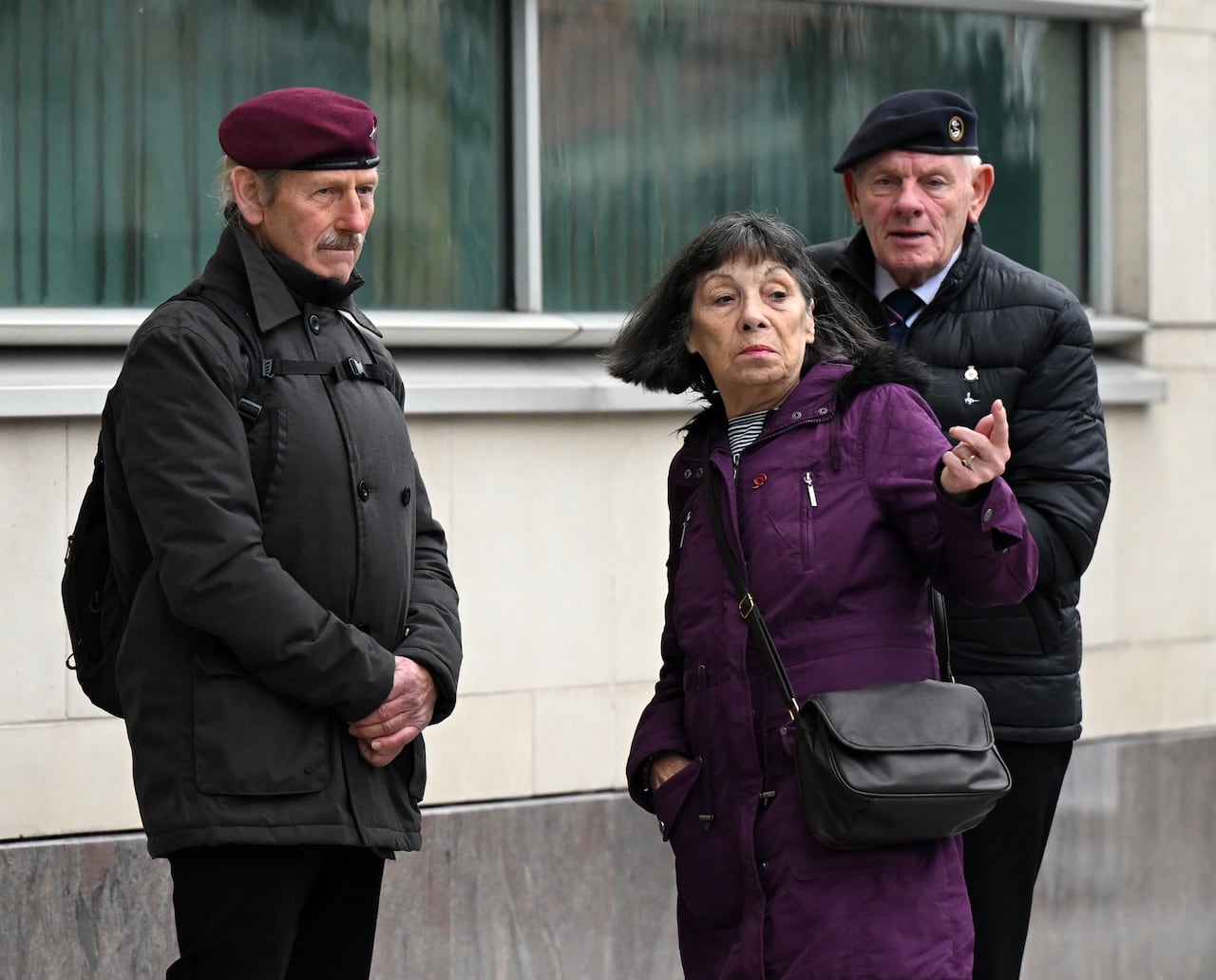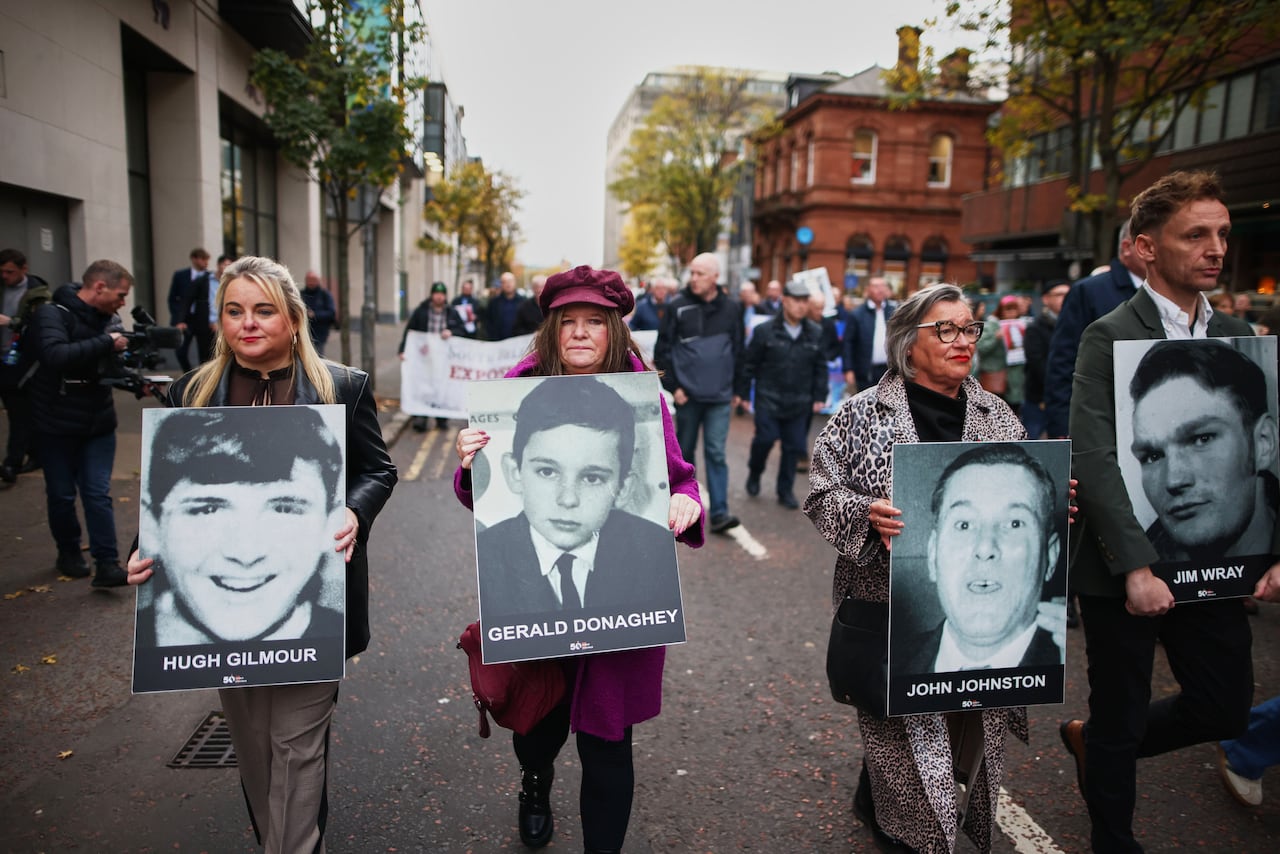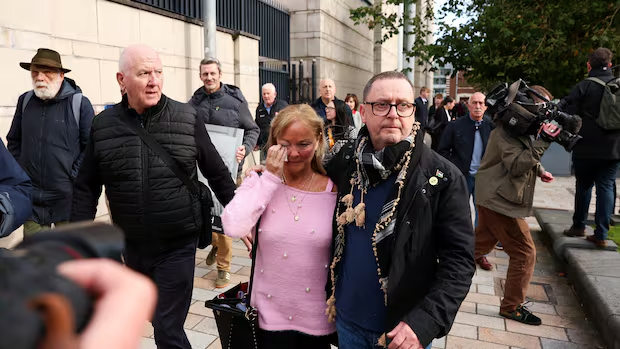A former British paratrooper who was the only soldier ever charged in the 1972 Bloody Sunday massacre in Northern Ireland was acquitted Thursday of murder charges.
Judge Patrick Lynch ruled at Belfast Crown Court that prosecutors failed to prove that the veteran identified only as Soldier F had opened fire on unarmed civilians who were running to safety.
At the judge-only trial, Lynch said the evidence presented against the veteran fell well short of what was required for conviction.
The verdict, which reflected the weak evidence prosecutors had to rely on, was a blow to families of victims who have spent more than a half-century seeking justice.
The former lance corporal had been charged with two counts of murder and five counts of attempted murder. Prosecutors said that he fired at fleeing demonstrators on Jan. 20, 1972 in Londonderry, also known as Derry, when 13 people were killed and 15 others were wounded in the deadliest shooting of the period known as The Troubles.
Thirteen people were killed and 15 were wounded in the event that has come to symbolize the conflict between mainly Catholic supporters of a united Ireland and predominantly Protestant forces that wanted to remain part of the United Kingdom.
While the violence largely ended with the 1998 Good Friday peace accord, tensions remain. Families of civilians killed continue to press for justice, while supporters of army veterans complain that their losses have been downplayed and that they have been unfairly targeted in investigations.
Soldiers lost ‘all sense of military discipline’: judge
Soldier F had pleaded not guilty to two counts of murder for the deaths of James Wray, 22, and William McKinney, 27, and five counts of attempted murder for the shootings of Joseph Friel, Michael Quinn, Joe Mahon, Patrick O’Donnell, and for opening fire at unarmed civilians.
After the verdict, Mickey McKinney, McKinney’s brother, said the failure to bring anyone to justice “lies with the British state” for failing to investigate the murders “properly, or indeed at all, and with the British Army who shielded and enabled its soldiers to continue to murder with impunity.”
Shrouded from view in court by a curtain, Soldier F did not testify in his defence and his lawyer presented no evidence. The soldier told police during a 2016 interview that he had no “reliable recollection” of the events that day but was sure he had properly discharged his duties as a soldier.

While the judge acquitted Soldier F on the charges, he said that soldiers from the Parachute Regiment on duty that day “totally lost all sense of military discipline.”
“Shooting in the back unarmed civilians fleeing from them on the streets of a British city,” he said. “Those responsible should hang their heads in shame.”
But because there was no concept of “collective guilt” in the courts, he said that he wasn’t able to issue a guilty ruling.
Key witness no longer alive
Defence lawyer Mark Mulholland attacked the prosecution’s case as “fundamentally flawed and weak” for relying on soldiers he dubbed “fabricators and liars,” and the fading memories of survivors who scrambled to avoid live gunfire that some mistakenly thought were rounds of rubber bullets.
Surviving witnesses spoke of the confusion, chaos and terror as soldiers opened fire and bodies began falling after a large civil rights march through the city.
The prosecution relied on statements by two of Soldier F’s comrades — Soldier G, who is now dead, and Soldier H, who refused to testify. The defence tried unsuccessfully to exclude the hearsay statements because they could not be cross-examined.

“Their statements, the sole and decisive evidence, cannot be tested in a way that witnesses giving evidence from the witness box would be,” the judge said. “Delay has, in my view, seriously hampered the capacity of the defence to test the veracity and accuracy of the hearsay statements.”
Veterans group welcomes verdict
Prosecutor Louis Mably argued that the soldiers, without justification, had all opened fire, intending to kill and thus shared responsibility for the casualties.
Day 610:43Say Nothing considers the difficult questions at play during The Troubles
After reading the 2013 obituary of IRA member Dolours Price, author Patrick Radden Keefe started researching and writing his book Say Nothing, a true crime story set during The Troubles in Northern Ireland. His book is now an FX streaming series.
The killings were a source of shame for a British government that had initially claimed that members of a parachute regiment fired in self-defence after being attacked by gunmen and people hurling fuel bombs.
A spokesperson for current Labour Prime Minister Keir Starmer said the verdict is “an example of the complex legacy of the Troubles.” The government is “focused on setting out a way forward to deal with this difficult period in a fair and balanced way that allows victims to seek answers and get closure, including bereaved forces’ families,” the spokesperson said.
Veterans and their campaigners welcomed Thursday’s verdict.
“It has become increasingly clear that the admissibility of certain types of evidence, particularly those based on decades-old recollections, remains deeply problematic,” said Northern Ireland veterans commissioner David Johnstone.
“Soldier F has faced legal scrutiny in various forms for more than a quarter of a century, and it is my hope that today’s ruling by Judge Lynch brings that long and arduous process to a close,” he added.
A formal government inquiry cleared the troops of responsibility, but a subsequent and lengthier review in 2010 found soldiers shot unarmed civilians fleeing and then lied in a cover-up that lasted decades.
Then-prime Minister David Cameron apologized and said the killings were “unjustified and unjustifiable.”
The 2010 findings cleared the way for the eventual prosecution of Soldier F, though delays and setbacks kept it from coming to trial until last month.
Source link






